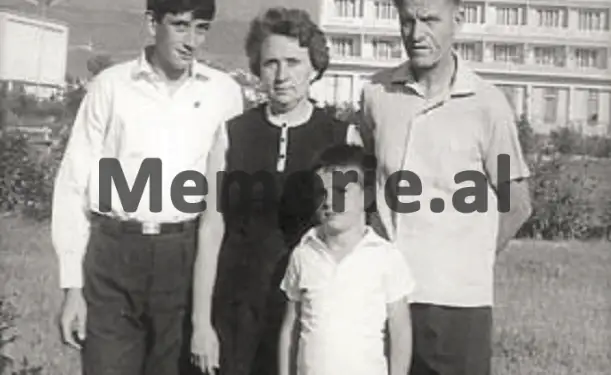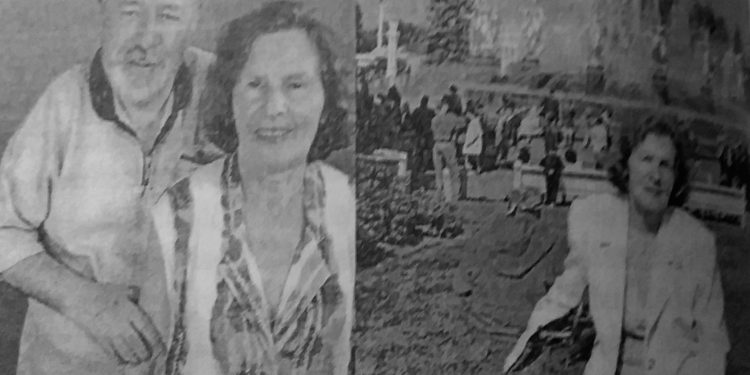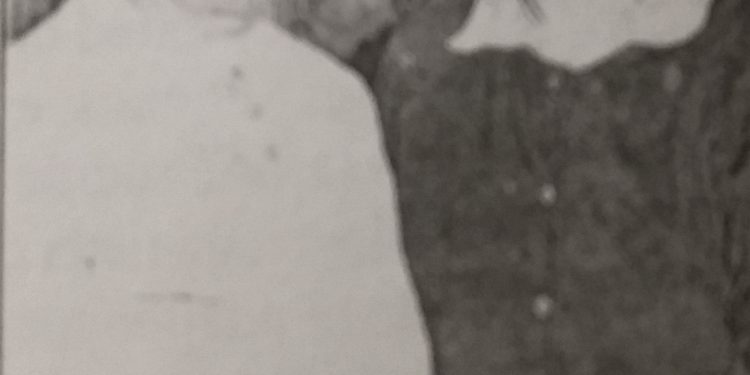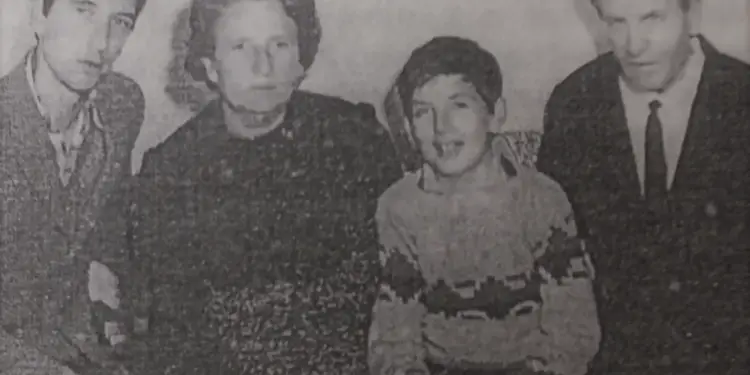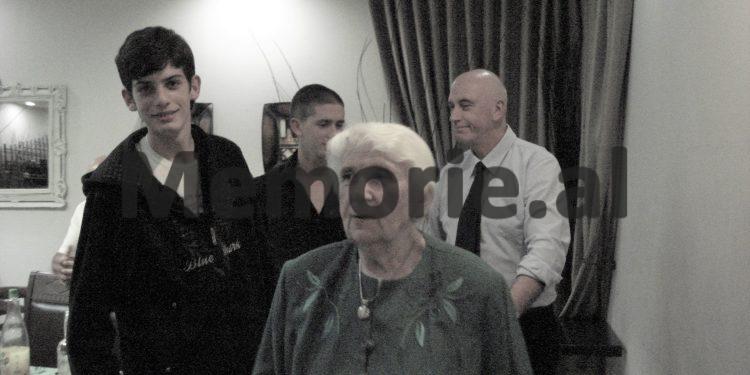By Taisa Batkina (Pine)
Part eighteen
Memorie.al/publishes the unknown story of the Russian Taisa Batkina (Pine), originally from Tula, Russia, the third child of a very poor rural family, who was left an orphan at a very young age, after her father lost her life while working in one of the coal galleries on the outskirts of Tula, where he worked as a miner (shortly after escaping arrest, accused of “supporting the enemies of the people”) and she grew up with difficulty great economic, as their city continued to be under the bombardment of German forces, which had reached as far as near Kursk. Taisa graduated from the Faculty of Chemistry, near the ‘Lomonosov’ University of Moscow, where she met and married the Albanian student, Gaqo Pisha, originally from the city of Korça, who at that time was studying at the Faculty of Philosophy in Moscow and both together in 1957, they returned to Albania, together with their newborn son, Sasha, and began life in the city of Tirana, where Taisa was appointed as a professor of Chemistry at the State University of Tirana, while Gaqo, in the chair of Marxism- where they worked until 1976, when the State Security arrested Taisa Batkina on fabricated charges, accusing her of being a “Soviet KGB agent” and sentencing her to 16 years in political prison, which she suffered. In the “Women’s Prison” in the city “Stalin”, from where she was released in 1986, while her husband, Gaqo Pisha, had died in 1983, from a serious illness. The tragic story of Taisa Batkina (Pine), in the inhuman camps and prisons of Enver Hoxha’s communist regime, where she spent a decade of her life, along with many compatriots from the former Soviet Union, or other Eastern European countries, comes through her memories, published in a book entitled “We hoped and survived”, memories which, her son, Aleksandër Pisha, kindly offered her for publication, in Memorie.al
We hoped and survived
I dedicate it to the bright memory of my husband, GAQO PISHA
This is a book of memories. In it I want to tell about my life and that of my friends, Soviet women, who tried prison for several years just because they got the courage and got married and linked their fate with that of Albanian students. The prison was part of the great GULAG in the small Balkan country, Albania, where for many years the bloody communist regime of Enver Hoxha ruled, who was a loyal student of Stalin and a follower of his cause.
Through this book I would like everyone to learn about the inhuman trials we experienced and the horrible years we spent in Albanian prisons, just because we… fell in love! And let no one ever forgets what totalitarianism, despotism is and what the consequences of this system are.
Continued from the previous issue
Life in prison, without outside help
Life in prison without outside help was very difficult. Women who did not work received a ration of bread, a fasting soup, and sugar-free tea. They had no money to buy anything in the store. Hunger did not leave us. The directorate could not decide who we were, Albanians or foreigners. This question also stood before the court. I wrote about it. They did not even take us to work, nor did they give us food supplements. The constant hunger forced some of our women, including Natasha, to look for a job as a camp director. Easy work inside the camp was not for us, who had become “enemies of the people.” The director of the camp persuaded Natasha and Zoja not to go to work in the field, because this job was not for them. But they insisted; it seemed to them that they could still do a little work and gain something. Then they sent them to the field with their friends. The work there was unbearable for us. They paid us pennies, only if we realized the 100 percent rate. Of course, for us this was unattainable. Those who worked were better fed, yet we returned from the weary fields. After a while, for Natasha the work in the field ended with a severe ulcerative crisis. The crisis started late in the evening, she remained in the corner of the room, sitting on the floor, broken in two, but… did not utter a word or groan. He did not want to disturb us because we had to get up early in the morning and go to work.
The crisis lasted for several days, but no one wanted to know about Natasha. We finally asked the command to send him to the hospital. He was taken to a hospital in the nearest town, not to the prison, and his tests began. But when the local Security authorities found out that the prisoner was hospitalized, panic broke out. We were kept in complete isolation: when we worked in the field, we had no right to exchange a word with the day laborers. The rulers were afraid of the truth. And Natasha, in the room with others in the hospital, could tell everyone. He was ordered to return Natasha to the camp immediately. The guard ordered the sick woman to get out of bed. The doctor, who treated him and did not know how the work stood, began to object. Natasha was in serious condition, but the doctor did not listen to her, they picked her up and sent her back to the camp. Natasha stayed ill for a long time; she was admitted to the camp nursing, then also to the prison hospital. When he returned from the hospital, he no longer went out on the field. He was sent to work in the construction brigade. Even this was no easy task. The brigade erected retaining walls and outbuildings with stones. Large stones, concrete, mortar all had to be lifted and placed by hand. From the work in the field this changed, that one did not have to march 8-10 kilometers every day and the working day ended faster. In her spare time Natasha embroidered, finished orders and thus earned some food. This work continued for years.
Good news for Natasha
One day, during the meeting, my son said in my ear: “Mother, I will send you some money, 500 of them belong to Natasha”. So her family began to help Natasha. I was hospitalized in the prison hospital in Tirana, the boy came to see me and, when the guard did not mind, he told me in a low voice, in Russian, that Natasha would go to see her children. How I rejoiced! I could not bear to go back to the camp and give the good news to Natasha. Meetings with relatives were the happiest, brightest events in prison. I was finally ordered to get dressed, taken out of the hospital, put in a metal box on top of the truck, and sent to camp. Troubled journey! In the coffin to breathe, to torture thirst. After nearly four hours, the truck stopped, we arrived. I barely got out and went down, glanced at the yard, behind the wire fence. None! It was very hot. Suddenly Natasha caught my eye. I gestured to her and she came running to the gate. This was strictly forbidden, but it was hot and no one came out of the command building, and the guard was away and Natasha was in danger. I told him the good news quickly. She was happy. But how happy was the day when his daughter first came to the meeting!
It was a hot summer day. Natasha was working outside the camp gate, where they were building something. The girl came and stopped in front of the checkpoint. You can continue only accompanied by the service guard. From there to Natasha’s workplace was almost 200 meters. But, even though so far away, even though after so many years of not being seen, even though Natasha wore a big straw hat on her head, wearing the prison uniform that made women look all the same, Ira immediately recognized her mother . The women, who worked nearby in the garden, asked the girl who she had come to. She pointed to Natasha. Everyone thought she was wrong, because no one came to Natasha and everyone knew that. But Ira insisted. Natasha did not know anything about the meeting, from a distance she could not know her daughter and was extremely surprised when she was told that she has a date. They let him enter the camp, then the meeting took place near the gate; meeting impregnated with joy, sorrow, gas and tears! Natasha and I rejoiced. After this first meeting, there were others. Relatives helped Natasha, and she shared everything with the unfortunate, lonely old women, whom she had helped before, as much as she could. Natasha spent 11 years in prison and, after experiencing and enduring it all, came out in 1986, released from amnesty and returned to her family.
Barbara Haxhihyseni
Life in the camp was very monotonous, all the days were like each other and I cannot remember when Barbara came to the camp…! She was a tall, dark-haired woman, about 50-55 years old. She spent most of her time lying down, often being taken to hospital. At first I knew little, we almost did not socialize with each other. In April 1983, we were shot together in a room in the Tirana prison hospital. We spent ten days there and became friends. Barbara sang very beautifully. All day long I begged her to sing me something and she made me happy. He sang arias from operas and operettas, romances, Russian and Hungarian folk songs. She was Hungarian. Her fate is tragic. He came from a Hungarian communist family. During the war he was arrested and tortured in Nazi prisons. The marks of wounds on his body were still visible. After the war he was assigned to work in diplomacy. He served in Egypt for several years, then was sent to Albania, to the Hungarian embassy. In Albania, Barbara, a cheerful girl who loved to sing and dance, met an Albanian violinist. After some time, despite the objections of the Albanian and Hungarian authorities, she married him. Barbara received Albanian citizenship. Of course, he was immediately released from the Hungarian embassy. The Albanian and Hungarian sides held a distrustful attitude towards her. They had no children. They made life materially difficult; Barbara did not work, she tried to create normal living conditions at home. They got along very well with each other, but that was just the beginning for the troubles. Barbara’s husband fell ill. Suffered a nervous disorder. His wife took care of him at every opportunity. The illness lasted a long time, sometimes he was taken out of the hospital, but he was still hospitalized… in a psychiatric hospital. But the Albanian security did not want to know about the husband’s illness, they did not want to know anything.
Barbara’s arrest
In the long list of spies, a Hungarian woman was missing. During another aggravation of Fatos’s illness (as Barbara’s husband was called), when he was hospitalized, his wife was arrested. He was charged with espionage. This time she is beaten and tortured by other fascists, her comrades of the communist party, but not in Hungary, but in Albania. Barbara could not stand all this. Sometimes in a serious condition, with a heart attack, with nervous disorders, they hospitalized him, treated him somewhat and again started forcing him to accept. He was eventually sentenced to 14 years in prison and hospitalized again. Now another serious diagnosis has been added to her illness: skin cancer. They operated on him, radiographed him and brought him to the camp. Barbara’s seriously ill husband, who was accustomed to being visited by his wife every day, was very upset. Guess what, no one told him about the woman’s arrest. Fatos escaped from the hospital and learned at home from his men about his wife’s fate. That same evening he hanged himself. Barbara was not told anything about her husband’s death. She was convinced that she had been arrested and isolated, because as an embassy employee, she knew a lot about relations between the countries of the socialist camp, especially during the period of the breakdown of these relations. She knew many other secrets, from those that the Albanian side did not want to be told.
Barbara was not told about her husband’s suicide!
There were rumors from outside that Barbara’s husband had committed suicide, but no one dared to tell the unfortunate woman about it. She lived with great difficulty in the camp. Nobody came to him, nobody helped him. There was no one to come. She was almost hungry. In fact, they sometimes gave him a little more food, as he was sick, and often sent him to the hospital. With unparalleled ferocity, the authorities endeavored to avoid any case which might end in death, especially for foreigners; they feared social and international opinion. In Hungary, of course, they knew about Barbara’s fate, but the Hungarian government did not move a finger to help her compatriot, to free her from prison. Barbara in appearance looked weak, overwhelmed by circumstances, by prison, hunger… But, in fact, she was kept strong. The unwavering belief that she would return home, continue living with her beloved husband, gave her strength. She fought resolutely for life and defeated cancer. I remember the day when the nurse entered the prison hospital room and addressed Barbara with a smile: “The tests turned out well. The biopsy is negative! ” But ahead awaited another test; they called her to the command and informed her of her husband’s tragic death, told her that the apartment, with the furniture and belongings inside, was closed and sealed. Barbara despaired; all dreams and hopes were shattered, the impetus that helped him survive disappeared. The women tried to support him, to get him out of the state of depression. And she little by little seemed to recover.
After a while someone caught sight of Barbara’s house and offered her a small sum of money. Barbara, hungry, overwhelmed by disease, agreed. They took him home, let him take some of his personal belongings, and put the money in his account. Barbara was a generous man. The first thing he did, after receiving the money of the house, organized a funeral ceremony in memory of the unfortunate husband. It was not spared. He tried to thank all those who had helped him and to help those who needed help. Soon the money ran out and the usual prison life resumed. Barbara had told me many things about the events of 1956 in Hungary; how her family hid, old communist families; for the corpses of Soviet soldiers massacred by the enraged mob; for the bloodshed in the streets of Budapest. Barbara was released with us in the 1986 amnesty. Now she had nowhere to live. Vola and I stayed in a third-class hotel. But, both worldwide and in Albania, the situation began to change. Perestroika began in the Soviet Union. The Hungarian government finally remembered Barbara, the embassy helped her get through the difficult period, then even return home. Prison severely damaged her health. Despite the efforts made in Hungary to get him back on his feet, although they sent him to curative hospitals, to good clinics… they could not cure him. Barbara died after living with her people… two years.
Ina Shahe
Ina, was one of my best friends, with whom life in Albania connected us. Ina and her husband, the Angel, were good, smart, cheerful people; it was a pleasure to communicate with them. I enjoyed meeting them both, clever conversations, jokes, anecdotes, many of which were instantly fabricated. The fate of their family and the family of Engjëlli’s sister was another living proof of the crimes of Enver Hoxha’s regime. All their life in Albania they spent and worked honestly in the city, which bore the name of Stalin (his old name: Kuçovë). The angel was kept for the best mechanical engineer for oil equipment. Ina was also a mechanical engineer. Both had graduated from the oil institute in Moscow. In 1960, the husband of the Angel’s sister, the admiral (Teme Sejko), was accused of espionage in the service of Greece and after a sensational trial, was shot. I mentioned above that Khrushchev had been against this accusation and demanded that the matter be reconsidered under the command of the Warsaw Pact, but Enver refused; he feared that the investigation would reveal the futility of this lawsuit. But this is another topic, for him, for sure, it was written in Albania, I do not know. I write about what I have seen and know for myself. The admiral’s family was exiled to Berat, a city in the mountains, in the center of Albania. His wife became ill with a nervous disorder and could not work. The parents helped her raise the children. The angel could not even see his sister; in Albania this posed a danger, you could be persecuted, you could even end up in prison, but he helped his mother and the mother his daughter.
I mentioned earlier that the Great Cultural Revolution, which erupted in 1966 in China, also affected Albania, where many of what was happening in China began to come to life. Persecutions intensified in the country, and persecutions began, especially against intellectuals. In the opera house all the works of foreign composers were removed from the repertoire. At the National Drama Theater, a theater with very good traditions of classicism and with an excellent troupe, they started to prepare the Chinese drama “The Great Impenetrable Wall”. The walls of houses on the streets and businesses were filled with “dacibao” (lightning leaf), where everything was criticized. During this period, sometime in 1968-1969, the persecution justified from above against the Angel began in the ‘Stalin City’. Lightning bolts were hung in the city every day, where the Angel was insulted for arrogance, excessive self-confidence, behavior for conceited, for selfishness, laziness, and immorality and other sins of all kinds. The same accusations were contained in the article in the local newspaper; his name was mentioned at every collective meeting. There were also brave men in the city, which came to his defense, writing denials. In the city the Angel was loved for his excellent work, for his self-sacrifice and loyalty. He had a series of rationalization proposals, had participated in the design and assembly of various lines, equipment, to have written newspapers. They also loved the Angel for his cheerful character, honesty and nobility. But these brave ones were soon silenced.
At that time we lived in Berat, not far from the ‘Stalin City’. I read in the newspaper the article against the Angel and went to their house. The situation at home was very serious. The angel was lying on the sofa, facing the wall and not talking to anyone. No one knew how this story would end, except they thought it was the worst. This savage persecution lasted a month. The Angel was then expelled from the party and assigned to another job. After some time they returned him to his previous work; his knowledge and skills at work were still needed. But the troubles did not end there. Enver Hoxha, the bloodthirsty, cunning and treacherous dictator, has always sought to destroy the families of those whom, for one reason or another, he ransacked. He took special care to destroy their children, anticipating in them potential enemies. There have been many such examples in Albania. I will tell you what I know. The sons of the shot admiral, the nephews of the Angel, grew up wise, good. The youngest son, Sokoli, after completing his military service, worked in the textile factory in Berat. The issue of the attempt to burn the plant was planned in advance there. /Memorie.al




